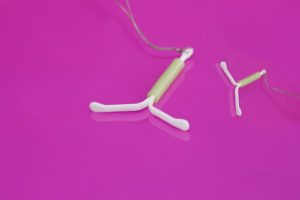Back to Contraception List
 99% effective at preventing pregnancy. The intrauterine system(IUS) is a small plastic T shape that releases progesterone when it goes into the womb.
99% effective at preventing pregnancy. The intrauterine system(IUS) is a small plastic T shape that releases progesterone when it goes into the womb.
It stops sperm getting to the egg and prevents implantation of the egg in the womb. An IUS is a long-lasting and reversible method of contraception, but it is not a barrier method. This means that it cannot stop you getting sexually transmitted infections (STIs).
The IUS is similar to the intrauterine device (IUD), but works in a slightly different way. Rather than releasing copper like the IUD, the IUS releases the hormone progestogen, which prevents pregnancy (HSE, 2017).
The IUS that is available in Ireland is called Mirena and works for up to five years after being fitted. If you are 45 or older when you have the IUS fitted, it can be left until you reach menopause or you no longer need contraception. It must be fitted by a trained doctor or nurse at your GP surgery, family planning clinic or sexual health clinic.
Benefits of choosing the IUS
- Does not interrupt sex.
- It is effective immediately after it is put into the womb.
- The Intrauterine system can last between 3-5 years.
- Fertility will return to normal when the IUS is removed (Think Contraception, 2017).
Disadvantages of choosing the IUS
- Some medication can reduce effectiveness therefore its recommended that another contraceptive method should be used if taking medication.
- The system can cause irregular bleeding in the first couple of months after the system is put in place. It is then likely that light or no periods occur.
- The insertion and removal must be done by a doctor who is trained in this procedure.
- The intrauterine system doesn’t protect against STIs
- There’s a small risk of getting an infection after it’s inserted.
- It can be uncomfortable when the IUS is put in, although painkillers can help with this.
- (HSE, 2017), (NHS, 2017).
For more information on the IUS, click on any of the following links;